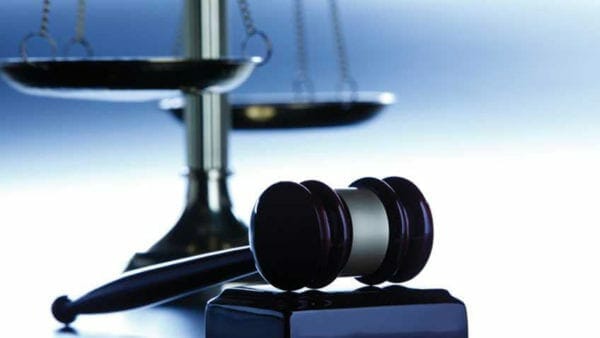Opinion

In his last protest march, Martin Luther King Jr. led a parade of demonstrators down Beale Street in Memphis, Tennessee, lending his support to striking sanitation workers. After a few young Black men started breaking storefront windows, the indiscriminate police response killed one suspected looter and injured dozens of protesters.
Under a legal theory blessed by the U.S. Court of Appeals for the 5th Circuit, King could have been held liable for the unanticipated harm that ensued from that March 1968 protest, even though he neither directed nor advocated vandalism or violence. On Monday, the U.S. Supreme Court declined to review that decision, which threatens to chill the exercise of First Amendment rights by exposing protest leaders to crushing civil liability based on conduct beyond their control.
The case involves a lawsuit that blames Black Lives Matter leader DeRay Mckesson for injuries a police officer suffered during a 2016 demonstration in Baton Rouge, Louisiana, after someone hurled “a piece of concrete or a similar rock-like object” that struck him in the head.
Last June, a divided 5th Circuit panel allowed that lawsuit to proceed on the theory that Mckesson “negligently” organized a protest on the street outside police headquarters when it was “reasonably foreseeable for the police to respond, and violence to ensue.”
That ruling flies in the face of First Amendment principles the Supreme Court reaffirmed less than two weeks later. In Counterman v. Colorado, which involved a man who had sent hundreds of alarming Facebook messages to a local musician, the court held that mere negligence was not enough to hold him criminally liable for “true threats.”
In this context, Justice Elena Kagan said in the majority opinion, the appropriate standard is recklessness, meaning “the defendant consciously disregarded a substantial risk that his communications would be viewed as threatening violence.” That more demanding standard is necessary, she explained, because a negligence test, which does not require an awareness of risk, was apt to “chill protected, non-threatening speech.”
Kagan noted that “our incitement decisions demand more” than recklessness. “When incitement is at issue, we have spoken in terms of specific intent,” she wrote, recognizing that “incitement to disorder is commonly a hair’s breadth away from political ‘advocacy.'”
Even when someone endorses unlawful conduct, the court held in 1969, the person’s speech is constitutionally protected unless it is both “directed” at inciting “imminent lawless action” and “likely” to do so. The court applied that principle in a 1982 case involving a largely peaceful but sometimes violent boycott of white merchants in Claiborne County, Mississippi, that the NAACP launched in 1966.
Unlike Mckesson, boycott leader Charles Evers had endorsed violence, saying, “If we catch any of you going in any of them racist stores, we’re gonna break your damn neck.” The court nevertheless ruled that Evers could not be sued for damages suffered by white business owners.
Under these precedents, dissenting 5th Circuit Judge Don Willett thought, it is clear that Mckesson cannot be held responsible for someone else’s violence. He warned that the majority’s “novel ‘negligent protest’ theory of liability” would “reduce First Amendment protections for protest leaders to a phantasm, almost incapable of real-world effect.”
Such a rule, Willett said, “would have enfeebled America’s street-blocking civil rights movement, imposing ruinous financial liability against citizens for exercising core First Amendment freedoms.”
He cited King’s 1968 march in Memphis as an example.
There is still time to heed Willett’s warning. As Justice Sonia Sotomayor noted when the Supreme Court turned away Mckesson’s appeal, that decision “expresses no view about the merits” of his First Amendment claim, which the lower courts can now consider in light of Counterman.
“It is disappointing that the Court did not take the opportunity to bring this case to an end,” said David Goldberg, Mckesson’s lawyer. “But I am confident that the Court eventually will consider and repudiate this dangerous rule of law.”
About Jacob Sullum
Jacob Sullum is a senior editor at Reason magazine. Follow him on Twitter: @JacobSullum. During two decades in journalism, he has relentlessly skewered authoritarians of the left and the right, making the case for shrinking the realm of politics and expanding the realm of individual choice. Jacobs’ work appears here at AmmoLand News through a license with Creators Syndicate.


There is no First Amendment right to block public right of ways. Such street demonstrations require a permit, in advance, in order to preserve the rights of other people to peaceably go about their daily affairs.
So right Dean but it changes with who is doing it, if it fits the lefts narrative and agenda. A two tear system. What makes me mad is that congress has rules as well as the president that if you threaten them you can go to jail including a supreme court judge, but if you threaten a commoner like us, it’s oh well! Madonna threatened the white house when President Trump was in it saying “I must admit, I have thought about burning down the white house”. What happened, the left applauded her actions. Actor Johnny Depp made a comment,… Read more »
Wow, they took my upvote for you away. We can expect the closer we get to election day, the harder they will fight to keep their lie alive.
Everyone on Ammoland knows you are right Dave.
I’ve written my Attorney General and asked why these demonstrators are not prosecuted for kidnapping. When this happens on an expressway you cannot move forward or backwards and frequently cannot turn left or right. It can be dangerous to escape on foot. People in these trapped vehicles are being held against there will which is the definition of kidnapping.
I’d want to examine all the evidence very carefully before acquitting BLM. Unless you lived in the St. Louis region you did not see 98% of the crap that BLM pulled in Ferguson. Since then they have gotten very good and stepping up to the line and putting most of both feet over but not fully crossing it. It may be difficult to prove but there is no mistaking their evil and violent intent. When BLM marched through Ferguson nearly 10 years ago shouting their “What do we want? Dead cops! When do we want them? Now!” and their trademark… Read more »
problem is , there are so many bad cops it is hard to stand up for them. they will arrest you if you defend your business or property, so how do you defend them. …the oath they take should be the bases for the “laws” they enforce government be dammed